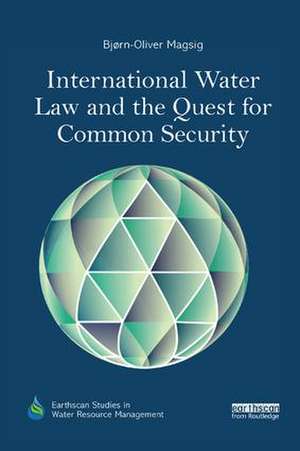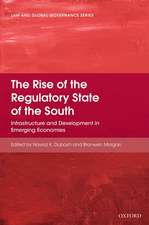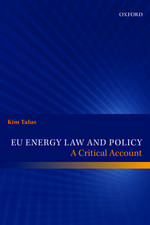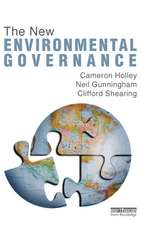International Water Law and the Quest for Common Security: Earthscan Studies in Water Resource Management
Autor Bjorn-Oliver Magsigen Limba Engleză Paperback – 23 oct 2017
| Toate formatele și edițiile | Preț | Express |
|---|---|---|
| Paperback (1) | 436.14 lei 6-8 săpt. | |
| Taylor & Francis – 23 oct 2017 | 436.14 lei 6-8 săpt. | |
| Hardback (1) | 1056.00 lei 6-8 săpt. | |
| Taylor & Francis – 23 mar 2015 | 1056.00 lei 6-8 săpt. |
Din seria Earthscan Studies in Water Resource Management
-
 Preț: 311.39 lei
Preț: 311.39 lei -
 Preț: 376.43 lei
Preț: 376.43 lei - 8%
 Preț: 390.17 lei
Preț: 390.17 lei -
 Preț: 155.43 lei
Preț: 155.43 lei -
 Preț: 312.75 lei
Preț: 312.75 lei - 9%
 Preț: 868.35 lei
Preț: 868.35 lei -
 Preț: 257.18 lei
Preț: 257.18 lei -
 Preț: 326.49 lei
Preț: 326.49 lei -
 Preț: 310.12 lei
Preț: 310.12 lei -
 Preț: 279.32 lei
Preț: 279.32 lei -
 Preț: 326.26 lei
Preț: 326.26 lei -
 Preț: 491.82 lei
Preț: 491.82 lei - 18%
 Preț: 1060.25 lei
Preț: 1060.25 lei -
 Preț: 470.90 lei
Preț: 470.90 lei - 18%
 Preț: 1000.27 lei
Preț: 1000.27 lei - 10%
 Preț: 311.38 lei
Preț: 311.38 lei -
 Preț: 479.19 lei
Preț: 479.19 lei -
 Preț: 442.68 lei
Preț: 442.68 lei - 18%
 Preț: 1000.27 lei
Preț: 1000.27 lei - 18%
 Preț: 1056.32 lei
Preț: 1056.32 lei - 18%
 Preț: 1054.71 lei
Preț: 1054.71 lei - 18%
 Preț: 1064.70 lei
Preț: 1064.70 lei - 18%
 Preț: 1001.84 lei
Preț: 1001.84 lei - 18%
 Preț: 1051.55 lei
Preț: 1051.55 lei - 25%
 Preț: 767.07 lei
Preț: 767.07 lei - 18%
 Preț: 1002.80 lei
Preț: 1002.80 lei - 18%
 Preț: 1056.00 lei
Preț: 1056.00 lei -
 Preț: 469.34 lei
Preț: 469.34 lei - 18%
 Preț: 1177.10 lei
Preț: 1177.10 lei -
 Preț: 485.46 lei
Preț: 485.46 lei - 18%
 Preț: 1009.74 lei
Preț: 1009.74 lei - 26%
 Preț: 762.57 lei
Preț: 762.57 lei - 26%
 Preț: 764.20 lei
Preț: 764.20 lei - 12%
 Preț: 312.43 lei
Preț: 312.43 lei - 18%
 Preț: 730.71 lei
Preț: 730.71 lei - 12%
 Preț: 325.34 lei
Preț: 325.34 lei -
 Preț: 409.31 lei
Preț: 409.31 lei - 26%
 Preț: 764.87 lei
Preț: 764.87 lei -
 Preț: 416.22 lei
Preț: 416.22 lei -
 Preț: 483.49 lei
Preț: 483.49 lei
Preț: 436.14 lei
Nou
Puncte Express: 654
Preț estimativ în valută:
83.47€ • 86.48$ • 69.66£
83.47€ • 86.48$ • 69.66£
Carte tipărită la comandă
Livrare economică 21 martie-04 aprilie
Preluare comenzi: 021 569.72.76
Specificații
ISBN-13: 9780815378921
ISBN-10: 0815378920
Pagini: 224
Dimensiuni: 156 x 234 x 17 mm
Greutate: 0.45 kg
Ediția:1
Editura: Taylor & Francis
Colecția Routledge
Seria Earthscan Studies in Water Resource Management
Locul publicării:Oxford, United Kingdom
ISBN-10: 0815378920
Pagini: 224
Dimensiuni: 156 x 234 x 17 mm
Greutate: 0.45 kg
Ediția:1
Editura: Taylor & Francis
Colecția Routledge
Seria Earthscan Studies in Water Resource Management
Locul publicării:Oxford, United Kingdom
Public țintă
Postgraduate and UndergraduateCuprins
1. Introduction 2. Water Security: Conceptualising a Buzzword 3. International Law in the Water Security Discourse 4. Hydrosolidarity: The Answer to State-Centrism? 5. Regional Common Concern: The Legal Foundation for Common Water Security 6. Water Security in Himalayan Asia 7. Conclusion
Notă biografică
Bjørn-Oliver Magsig is a Lecturer in Law at University College Cork (Ireland) where he focuses on international environmental law, law of the sea and the links between natural resources, international security and equity. He teaches Public International Law, Contemporary Issues in International Law, International Environmental Law and Law of the Sea and has been appointed Programme Director of the LLM in Marine and Maritime Law. Bjørn-Oliver has lead various interdisciplinary projects revolving around the socio-legal challenges of managing transboundary natural resources, serves on the Managing Board of the European Environmental Law Forum (EELF) and is a member of the IUCN World Commission on Environmental Law.
Recenzii
"The importance of enhancing water security at multiple levels is becoming increasingly recognised. However, few studies offer in-depth analysis of the interplay between international law and water security, particularly within a transboundary water context. Through its fresh conceptualisation of security, its artful analytical framework, and rich case studies, this book therefore stands out as a major contribution to the water security discourse." - Alistair Rieu-Clarke, Centre for Water Law, Policy and Science, University of Dundee, UK
"...worthwhile reading for legal scholars and water experts alike in its case for contemporary development of international water law (IWL). Of particular value is the transformation of the vague concept of ‘water security’ into a methodological tool, which operationalizes a popular term often used in water policy with little understanding of – or guidance to – its application... While intended for legal scholars, the book is useful for readers of any discipline who welcome the intellectual exercise of grappling with the purpose of IWL and how it can be used to promote meaningful cooperation over freshwater. The book is not for the reader who wants detailed explanations of specific sources of IWL and the technical application of their legal provisions. This however is an overriding strength of the book, which remains accessible to the non-lawyer, while delving deeper intellectually than the traditional legal positivist." - Stephanie Hawkins in Water International (2016)
"...worthwhile reading for legal scholars and water experts alike in its case for contemporary development of international water law (IWL). Of particular value is the transformation of the vague concept of ‘water security’ into a methodological tool, which operationalizes a popular term often used in water policy with little understanding of – or guidance to – its application... While intended for legal scholars, the book is useful for readers of any discipline who welcome the intellectual exercise of grappling with the purpose of IWL and how it can be used to promote meaningful cooperation over freshwater. The book is not for the reader who wants detailed explanations of specific sources of IWL and the technical application of their legal provisions. This however is an overriding strength of the book, which remains accessible to the non-lawyer, while delving deeper intellectually than the traditional legal positivist." - Stephanie Hawkins in Water International (2016)
Descriere
This book provides a fresh conceptualisation of water security, developing an operational methodology for identifying the four core elements of water security which must be addressed by international law: availability; access; adaptability; and ambit.












